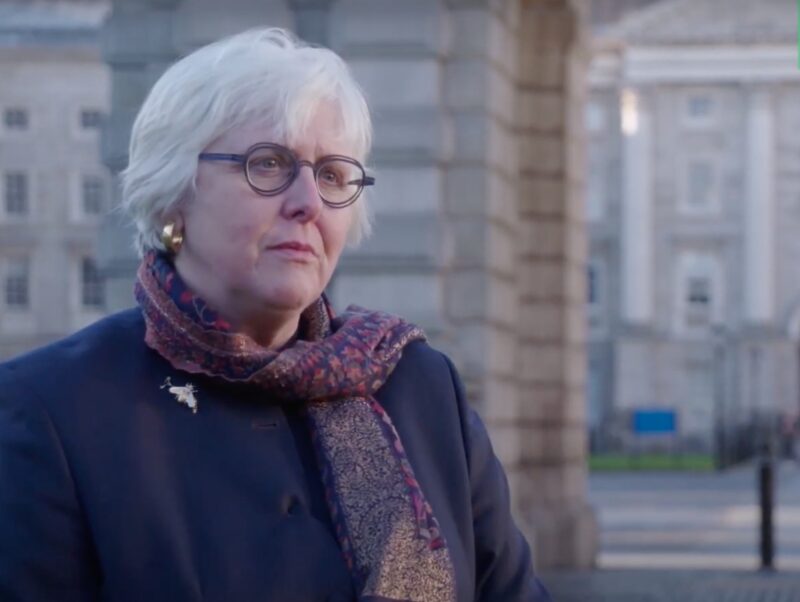You probably don’t need to be reminded that this week marks the first anniversary of the arrival of coronavirus to Ireland, and with this milestone comes an unwelcome reminder of all the holidays, parties, concerts and in-person lectures that we have missed out on because of it.
The rollout of vaccines is hopeful but this doesn’t take away from the disappointing reality that many more events will be missed out on before we can socialise properly again. One such event is Trinity Ball, arguably one of the biggest social milestones of the quintessential Trinity experience. And for two years now, students have been deprived of it.
With this in mind, provostial candidate Jane Ohlmeyer’s promise of not one, but two Trinity Balls in 2022 will have come as a welcome surprise to those who opened her email on Monday. The email, sent out to all students under the subject line “A Better Trinity: My Vision for Empowering Students”, was a direct appeal to students ahead of the Provostial election on April 10th.
In the email, she promised to establish a Task Force composed of student representatives from across campus life to provide a forum for students to voice their opinions on how the Trinity experience can be improved for students. However, this pales in comparison to the significance of the promise of an extra Trinity Ball.
The rollout of vaccines provides a cause for hope but this doesn’t take away from the disappointing reality that many more events will be missed out on before we can socialise properly again
Making Trinity Ball the centre of this deal was a clever, if curious, move. Trinity Ball is undoubtedly one of the highlights of the Trinity experience, and the mention of it will likely have stood out to eagle-eyed students who read it. Indeed, it’s fair to say that there’s nothing we, as young adults, have missed more in the last year than a good night out.
For me, personally, I can’t remember seeing a single performance at Trinity Ball. Rather, I have missed the many friends I only ever saw at this annual event while lost on Front Square in the early hours of the morning. The yearly complaints over its lineup never concerned me as I knew I was only going to see the people whose faces I hadn’t seen around campus since my first year in Halls. As a final year, I have been lucky enough to attend two of them, so my heart goes out to the first and second-year students who are still waiting to go. Ohlmeyer’s promise of a double bill of Trinity Balls to compensate for this loss was, in some ways, a stroke of genius.
That being said, it’s hard not to feel some cynicism at the sight of the email. To characterise our concerns in terms of a missed evening ball is, in my opinion, overly reductive. It diminishes the very real issues that students will be looking to a new Provost to solve. The pandemic has cost more to us than a few missed nights out.
For many, the instability of online learning has cast doubt over the quality of our education. The prevailing uncertainty caused by the enormous societal shift in the last year has likely hindered student productivity and compromised student outcomes. Losing out on nights out is but one small part of the chaos we’ve endured in the last year.
Doubling college’s Trinity Ball offering for 2022 is obviously not Ohlmeyer’s primary campaign promise, but to the students thus far disengaged with the upcoming Provost elections, this will become her standout idea. And while her email did mention her hopes to avoid our age group becoming a so-called “lost generation”, putting an eye-catching Trinity Ball plan at the centre of today’s student appeal will become its main takeaway.
Doubling college’s Trinity Ball offering for 2022 is obviously not Ohlmeyer’s primary campaign promise, but to the students thus far disengaged with the upcoming Provost elections, this will become her standout idea
Furthermore, just how these events will factor into the country’s vaccination timeline remains unclear. After a year of online lectures, a more pertinent question is just how quickly we can return to in-person teaching, so focusing primarily on how her “New Deal” will address this concern might have been more appropriate.
Ohlmeyer would have done well to have framed these very real concerns at the core of her message, rather than try to appease us through offering an extra Trinity Ball. At this stage, we are more than merely alcohol-deprived beings. And while we could all do with an extra night of drunken revelry on Front Square, many of us just want to know when exactly we can sit in lecture theatres again, and what a post-pandemic campus will look like under a new provost’s leadership.
Let’s hope that in the weeks to come, Ohlmeyer and her two opponents strike the appropriate balance between promising more tantalising social events and forging a realistic path to the return to on-campus teaching.







